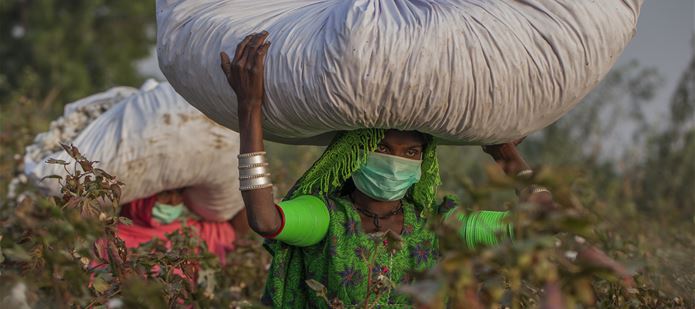
CABI is helping Pakistan’s cotton industry to reduce losses of around $350m a year through poor production, transport and storage practices by training thousands of farmers and workers as part of the Better Cotton Initiative.
Cotton is Pakistan’s largest industrial sector and has played an important role in the economic development of the country and remains a key livelihood source for more than one million farmers.
However, the misuse of pesticides and water, the inappropriate use of chemical fertilizers, transportation and storage problems as well as gaps in knowledge and skills have resulted in the industry annually losing around 10-15 percent of its value.
Funded by the Better Cotton Initiative’s Growth & Innovation Fund, and working with a range of partners including the Government of Sindh Agricultural Research Department, CABI has trained more than 22,000 farmers and 35,000 farm workers (males and female) on ways of practicing Better Cotton production principles and criteria on 90,000 hectares of cotton crop from where nearly 96,000 metric tonnes of Better Cotton lint is produced.
In addition, CABI has enhanced the capacity of 840 medium-sized farmers to implement the Better Cotton Standard System with a focus on protecting crops from harmful pests and diseases and to conserve the natural habitats on the farms.
Furthermore, more than 18,000 women workers have been trained on proper cotton picking, health and safety, female empowerment and the prevention of child labour.
Rauf Ahmad Khan Laghari, Project Manager at CABI’s Pakistan office, said, “We have been trying to instil on farmers good agricultural practices that will help them conserve limited resources and produce Better Cotton as a sustainable mainstream commodity.
“It is hoped that through ongoing engagement with the Better Cotton Initiative we will encourage proper cotton picking to avoid contamination, better storage and transportation to markets and ginning mills where it is processed and thereby enable famers to adopt a decent work strategy.”
Moving forward, it is hoped that the Better Cotton Initiative strategies will be implemented on a country-wide basis and reach out to more than 500,000 farmers who rely on cotton crop for their livelihoods.
Mr Laghari added, “We also need to encourage the use of biological control for pests and diseases through ‘Natural Enemy Field Reservoirs’ as well as increasing the fertility of soil by using compost and undertaking soil analysis and ‘nutrient scouting’ to apply the right nutrients.
“We aim to extend our work in existing areas to achieve ‘saturation’ and to expand our work in Sindh and hopefully beyond.”
This article is cross-posted from the CABI website.
Photo credit: Asim Hafeez
